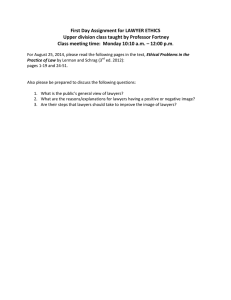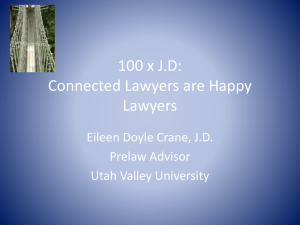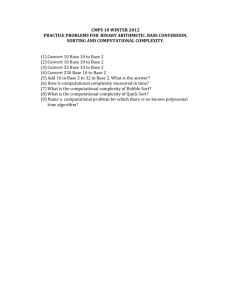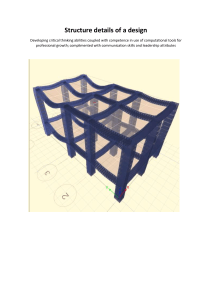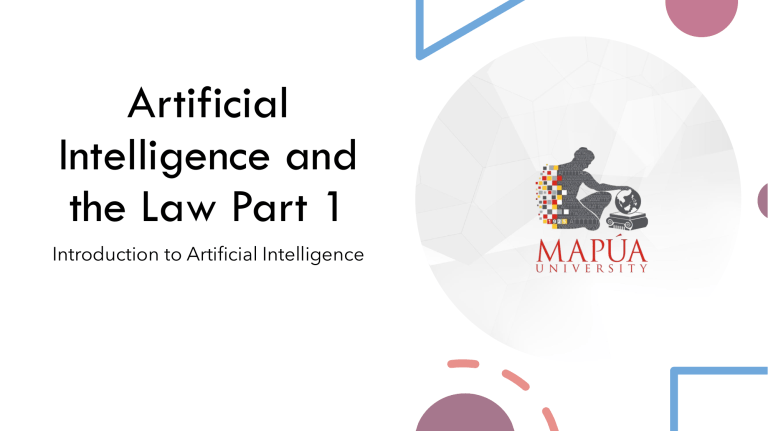
Artificial Intelligence and the Law Part 1 Introduction to Artificial Intelligence How will AI affect the law? How will AI change the practice of law? How is AI used to help lawyers? Outline What is computational law? Can a computer program enter into agreements and contracts? Should an intelligent agent be limited in what is permitted to do? How will AI affect the law? The next slides will attempt to present how Artificial Intelligence will change the practice of law as well as the way laws will be formulated and administered, and why the emergence of AI systems will require modification and extension of current legal concepts and principles. How will AI change the practice of law? • American Bar Association (ABA), formed in 1878 • Formed by 25 prominent lawyers in 1878, and today has 400,000 members • Nearly 1.3M lawyers licensed and ABA established a set of rules to ensure that the practice of law meets high ethical and professional standards • Today, not only do attorneys have near-instant access to virtually all case law, a wide variety of information systems support their work in drafting contracts, briefs, and all manner of legal documents. • Lawyer works which can be done by AI • Television mainly portrays lawyers representing their clients in front of judges and juries, but legal activities are transactions, not disputes: • Drafting Contracts • Filing for divorce • Purchasing a house (requires lawyers) • Applying for patent • Petitioning for a change of immigrant status • Forming a corporation • Declaring bankruptcy • Writing a will • Writing an estate plan • Registering a trademark • Transactional works of lawyers are connected to “fill in the blanks” form • AI (decision-trees) which helps the customer fill them out, and since lots of “blanks” are dependent, based on the contents of other “blanks,” why not have the software skip the inappropriate ones? • For example, if you don’t have children, you don’t need to fill in information about child support on a divorce form. • While it’s generally acceptable for software programs to provide forms, it is not acceptable for them to do “document preparation.” • LegalZoom, a leading company that provides document preparation to consumers over the Internet, has been the target of numerous lawsuits alleging that it is engaged in the unauthorized practice of law. • FairDocument, which wrapped their business as estate planning, but leads itself as a lawyer referral service: • Its sophisticated algorithms interview you about your desires and needs • Then the company provides a draft document to an independent lawyer, who reviews and completes the work (often with few or no changes). Then you pay the lawyer a fee — usually far less than typical estate attorneys charge — and FairDocument gets a cut. • Resolving Disputes • An AI resolving disputes before they rise to the level of a legal action or get to trial • If conflicts can be resolved privately, all parties are better off. To date, this involves the use of professional negotiators, mediators, and arbitrators essentially acting as private judges. However, new techniques are moving the role of technology beyond simply facilitating communication between the parties to actively participating in the resolution process. • Modria, a purpose-built for online dispute resolution, made to resolve up to 90 percent of claims for its customers without the need to escalate the issue to a human customer service representative. • Its software collects and analyzes the relevant information related to the dispute, even incorporating such subjective considerations as the complainant’s purchasing history and prior business relationships with the parties involved, then uses a set of guidelines, including policies for refunds, returns, exchanges, to propose and potentially implement a mutually acceptable resolution. How is AI used to help lawyers? e-Discovery • Many fresh law school graduates have been horrified to find themselves assigned the task of reading endless stacks of documents • Due to the ease of maintaining electronic documents, the volumes produced in response to discovery requests can be incredible • In one antitrust case, Microsoft produced over 25 million pages of documents, all of which had to be reviewed. How could this possibly be completed in a practical time frame at a reasonable cost? • A technique called “predictive coding” can permit a computer to perform this mind-numbing task with speed, diligence, and accuracy far exceeding that of human reviewers. • The criteria may involve everything from simple phrase matching to very sophisticated semantic analysis of the text, context, and participants. The newly trained program is then run on a subset of the remaining items to produce a new set of documents, and these in turn are reviewed by the attorneys. What is computational law? • Computational law is the study of structure of legal information, focusing on the automation of formerly manual processes and the integration. Computational law systems automate processes such as compliance checking, legal planning and regulatory analysis. • Approaches of computational law: • Algorithmic law attempts to create a legal language code that is machine-readable and machine-executable • Empirical analysis looks to citations, often used in law, to analyze and create citation indices and large graphs of legal patterns referred to as citation networks. • Computational law is not used only in legal applications and court rooms. • TurboTax, a tax preparation software for the United States and Canadian, uses computational law to make calculations based on tax laws to process tax returns • The non-profit organization Creative Commons uses computational law to provide custom-generated copyright licenses • Legal analytics uses big data and user-friendly tools to provide business intelligence and performance measuring solutions Can a computer program enter into agreements and contracts? • When you purchase something online, no human makes the decision to contract with you, yet the commitment is mandatory. • The Uniform Electronic Transactions Act (UETA), validates contracts formed by electronic agents authorized by their principals. Similarly, approve credit card purchases, issue credits, and so on. Should an intelligent agent be limited in what it is permitted to do? • For the purpose of equal distribution: • The town where I live offers two- hour free parking in many places, after which you are required to move your car. Why? To ensure that this free resource is distributed equitably and is used for temporary periods, such as while you are shopping or eating out, as opposed to all-day parking for employees who work nearby. • So is it fair to permit a self-driving car to repark itself every two hours? This would seem to violate the intent of the law. • A less visible though more annoying example is the use of so-called bots to purchase scarce resources online, such as concert tickets, and a practical reason to limit the agent in what it is permitted to do. • Will Smith submitted his vote via AI (that he created) as he was on holiday. Later on, he published this on his blog and some readers filed a case against him as US law requires a voter to personally vote, whether in person, by mail, or electronically. The use of intelligent agents to act on your behalf may be reasonably restricted in the future Questions?
